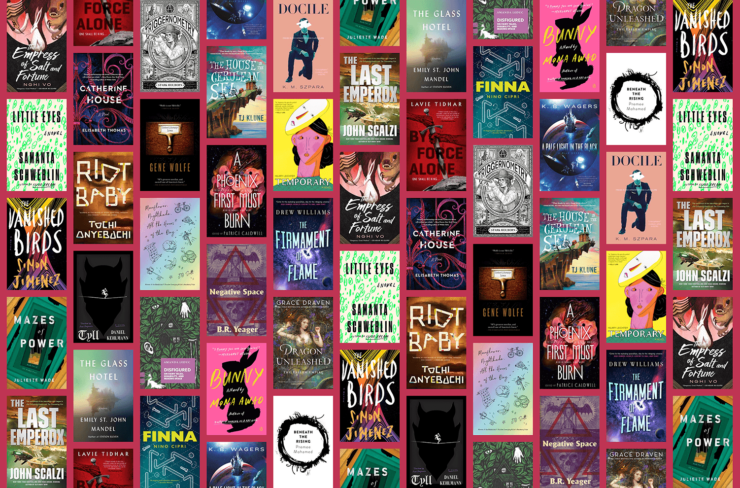We’re halfway through the year, and we have a lot of favorite new reads already. Our reviewers each picked their top contenders for the best books of the year (so far)—and they almost all chose different titles! This year’s highlights run the gamut from timely, techy science fiction and genre-bending epic fantasy, to heart-racing neo-gothic horror and powerful anthologies. We’ve got dragons, we’ve got empresses, we’ve got revolutionaries and superheros and wormholes in retail stores!
Take a look at our favorites below, and leave your additions in the comments!
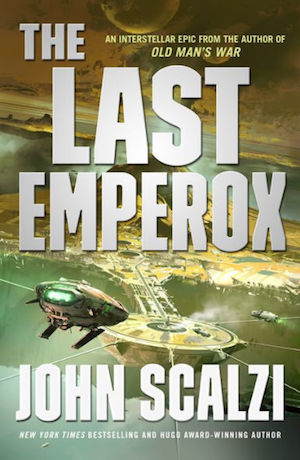
I had high expectations for The Last Emperox, the third and last installment in John Scalzi’s Interdependency Trilogy. I enjoy space opera, and I enjoy snark. And there are a lot of books out there that excellently combine the two. What’s even more enjoyable to find, however, is a story that takes place in space, throws in some snark, and also successfully sneaks in themes about how the history a society passes down is a little more than a crafted fiction, and how the idolization of mercantilism can create a civilization where protecting profits usurp saving billions of lives.
Those are dark themes—and issues that have become exceptionally relevant for the first half of 2020. But The Last Emperox and the two books before it, The Collapsing Empire and The Consuming Fire, convey theses issues in a way that doesn’t overwhelm at least some readers who are already struggling with the events of the last few months. So read it for the space opera-ness and the snark and maybe remember it for the themes on which it touches. Either way, it’s an immersive, engaging read.
—Vanessa Armstrong
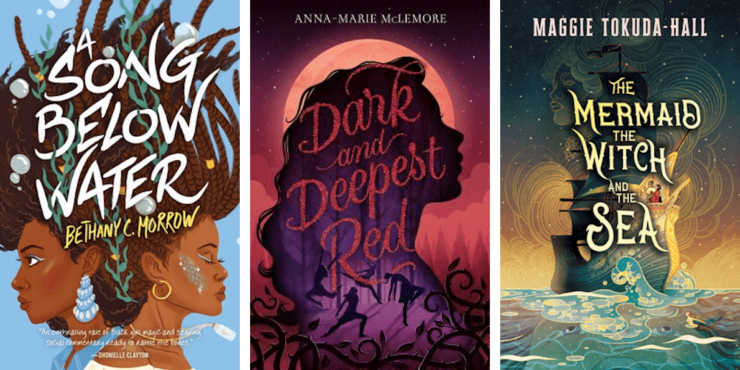
There’s just no way I couldn’t put A Song Below Water by Bethany C. Morrow on this list. There is nothing I didn’t love about this contemporary YA fantasy. With her story about two best friends trying to protect themselves from a world that wants to silence them, Morrow turns #BlackGirlMagic up to eleven. It left me feeling like I, no, we, my sisters in this fight, could dismantle a system that was built to oppress us. Consider me a fan for life.
Gorgeous. Heartbreaking. Poetic. Intense. Devastating. Inspiring. All of these descriptors could be applied to any one of Anna-Marie McLemore’s books, but especially their latest, Dark and Deepest Red. Their young adult fantasy tells the story of a queer Rromani girl in 16th century Strasbourg and her descendant and his Latina crush in 21st century America. The deeper McLemore pulls you in, the more layers are revealed. Themes of identity, gender, patriarchy, race, system oppression, and resistance bloom right before your eyes. And McLemore does it all with a writing style that is as beautiful as it is powerful.
Maggie Tokuda-Hall’s The Mermaid, the Witch, and the Sea was an unexpected delight. I went in expecting a fun little tale about queer pirates and magical mermaids and wound up with one of my favorite YA novels of the year. The setting is immersive yet intimate, the characters multifaceted and messy, the themes engrossing and emotional. Tokuda-Hall looked at all those other white cishet YA pirate stories that failed to tackle the larger issues of colonialism and patriarchy that seem part and parcel with the narrative and took those loose threads and stitched together a masterful tapestry.
—Alex Brown
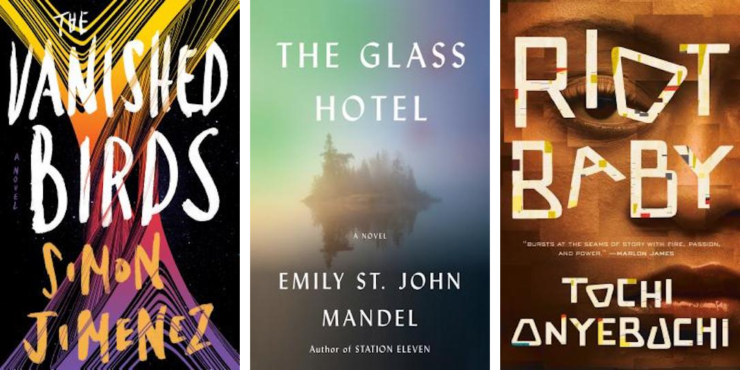
The Vanished Birds by Simon Jimenez was a book I literally finished on the cusp of headed into 2020, and even though this year has not been what we thought it might be, this book infused me and helped set my attitude for the year 2020 would ask of us. The Vanished Birds has a huge heart, even at its most dire, and speaks to humanity’s need and desire for family, love, and hope. The kind of book that celebrates overcoming the odds, and pushing yourself forward, no matter how dark life gets, or what those in power through at you to slow you down. This book is like if The Stars My Destination was given a beat-up, six-string guitar and asked to sit by the fire for a spell. The Vanished Birds was many things, but inspiring is at the top of the list, as both a writer, and a human being.
Last time, it was a pandemic. This time, it’s a ghost story. Emily St. John Mandel is a true talent, and while I loved Station Eleven, her newest novel was something entirely different, but mind-blowing all the same. The Glass Hotel is story of hauntings, of being haunted, and of being the ghost. With a cast of characters tangentially threaded to each other, The Glass Hotel treats every person with care, empathy, humanity, and understanding, even as they work to do the unthinkable, run from their insurmountable problems, or find themselves at the bottom of their lives. The whole book builds to a crescendo in the final five pages that left me a sobbing wreck.
What more is there to say about Riot Baby by Tochi Onyebuchi that hasn’t been said already? When I read this back at the start of the year, it wasn’t just an important, beautifully written story, but it was also timely, scathing, angry, and joyous, a firework aimed straight at the heart of institutions and aggressions and “the way things were,” destined to light a fire in anyone who read it. And with every passing day since, especially in the wake of the murders of George Floyd, Breonna Taylor, Ahmaud Arbery, Tony McDade, and so many more young, cis and trans Black men and women, Riot Baby only continues to burn itself into the current moment like a star brought to Earth. Tochi Onyebuchi wove magic and rage and pain and celebration and made it a song to sing when you’re fighting with everything you’ve got.
—Martin Cahill
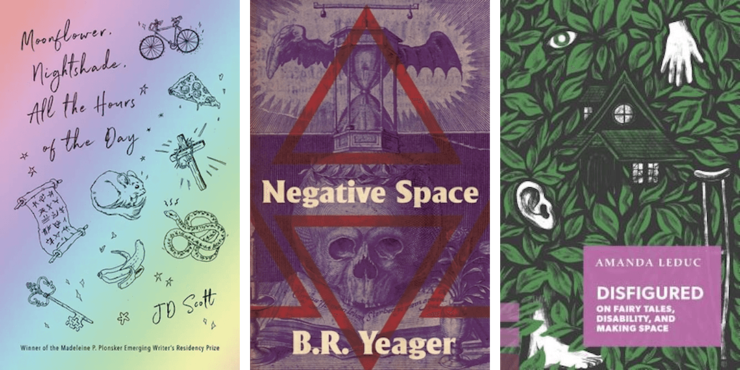
Right about now I’m drawn to books that echo that sense of a world in constant and rapid flux. Among those is JD Scott’s collection Moonflower, Nightshade, All the Hours of the Day. Scott’s fiction is nearly impossible to pin down, which is one of its strengths. Their work grapples with questions of intimacy and mortality; there’s a shift in one of these stories that made me loudly gasp when I realized just what it was Scott was doing. There’s also a novella set in a mall the size of the planet.
Premee Mohamed’s Beneath the Rising takes a very different approach, focusing on a globe-trotting adventure with more than a few traces of cosmic horror. One of its blurbs suggests Nick Harkaway’s The Gone-Away World as a point of comparison, and that’s both accurate and not: they’re both smart, engaging, kinetic narratives which also act as critiques of certain tropes within the genre with which they’re working. But Mohamed’s concerns are distinctly her own, and it took this novel to a few places I wasn’t expecting.
On a very different note, there’s B.R. Yeager’s Negative Space. Here, too, is a novel that doesn’t lack ambition: it’s a story about teen angst and familial legacies, set in a quiet corner of Massachusetts. Yeager throws an abundance of ritual into the mix, as well as a suggestion that the border between life and death is less rigid than one might expect; the end result is one of the most profoundly disquieting books I’ve read in a while.
Sometimes the right work of nonfiction can put a lot of the fiction you read into sharp relief. That was the case with Amanda Leduc’s Disfigured: On Fairy Tales, Disability, and Making Space, a fascinating look at how fantasy stories old and new wrangle with tropes, sometimes to harmful effect and sometimes achieving a state of beatific subversion.
—Tobias Carroll
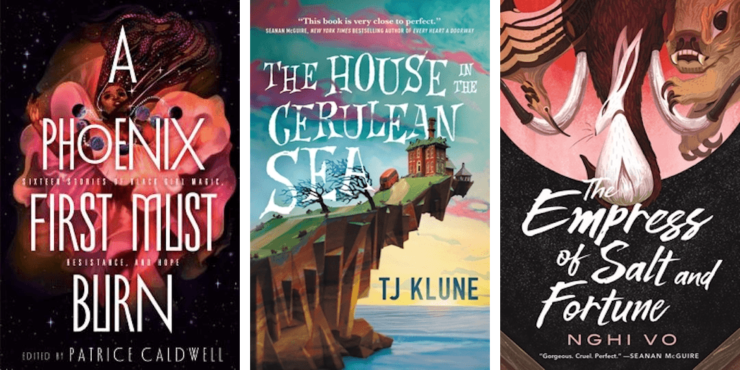
A Phoenix First Must Burn is one of the best anthologies, ever. Powerhouse editor Patrice Caldwell collects a staggering lineup featuring some of the most beloved names in speculative fiction, and some thrilling emerging voices. There’s so many shapes of freshly rendered magic here: alien worlds, enchanted love, a vampire outside your window, and more. Phoenix uses the speculative to interrogate systems of power–but also, to deliver unapologetic joy. Each individual story is brilliant in its own right, and as a collection, this book is an absolute triumph.
I turned to The House in the Cerulean Sea by T.J. Klune because it promised sweet, queer, whimsical magic and it delivered. It explores finding family in unexpected places, a dash of anti-establishment, and a rich, rewarding throughline of gay romance. It’s one of those novels that just feels good, that feels like watching the sunset over the ocean from the shoreline, wrapped in the warmth of a soft, fluffy blanket.
Nghi Vo’s The Empress of Salt and Fortune is dazzling and devastating at once. Of storytelling and archive, of how choice and narrative are always remaking the course of history. Vo infuses every sentence with power, worldbuilding an empire through memory and artifact. This novella is sheer alchemy, and I can’t wait for the forthcoming sequel.
—Maya Gittleman
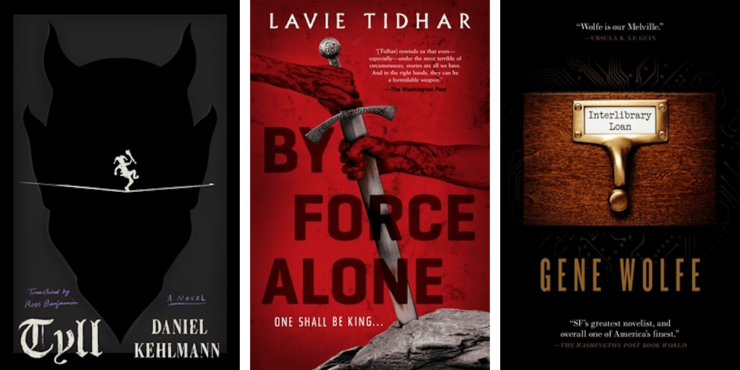
What a year these six months have been. Daniel Kehlmann’s Tyll was the baroque Thirty Years’ War picaresque I didn’t know I needed; it sent me running to the author’s backlist and even inspired me to pick up C.V. Wedgwood’s classic history The Thirty Years’ War. I also want to mention two books that likely would have been on my list in different circumstances. First, Lavie Tidhar’s irreverent Arthurian novel By Force Alone had its June American release pushed back to August. Second, I haven’t yet had a chance to read Gene Wolfe’s Interlibrary Loan, which publishes on the last day of June, but Gene Wolfe’s final novel deserves attention.
—Matt Keeley
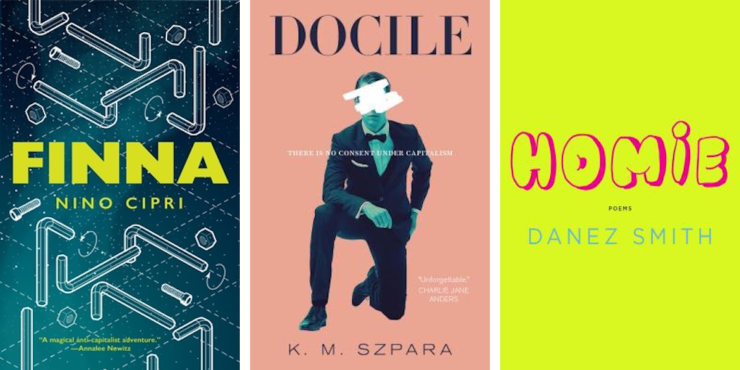
Writing about the best books I’ve read in the past six months without acknowledging that I’ve read half as much as usual would be kind of disingenuous, so: The stack of “books I’d like to read” is bigger than usual. But that doesn’t mean I haven’t had the luck of encountering several awesome books! A few favorites of those include: Finna by Nino Cipri, a novella featuring a wormhole-hopping pair of queer alt-Ikea employees who have recently broken up and must survive their underpaid hassle adventure while striving toward friendship (reviewed here). Docile by K.M. Szpara also hit all of my buttons—from the extremely hot sex to the long process of recovery after being broken under someone’s heel, Szpara explores topics of consent and capital from a perspective that is sharp and provocative.
Another novella that stuck with me, particularly given our moment in time in the USA, is Riot Baby by Tochi Onyebuchi. Featuring a concise, taut narrative arc split between two siblings with divergent paths, Onyebuchi explores questions of violence, resistance, and survival—as well as hope for change—under systems of white supremacy. And outside of the sff world, I’d strongly recommend folks pick up Homie by Danez Smith—a collection of joyous, enraged, beautiful, Black, queer poems. Smith is one of the best poets writing today; even if you’re not usually a “poetry reader” (whatever that might mean to you), you should read Homie. Trust me on that.
—Lee Mandelo
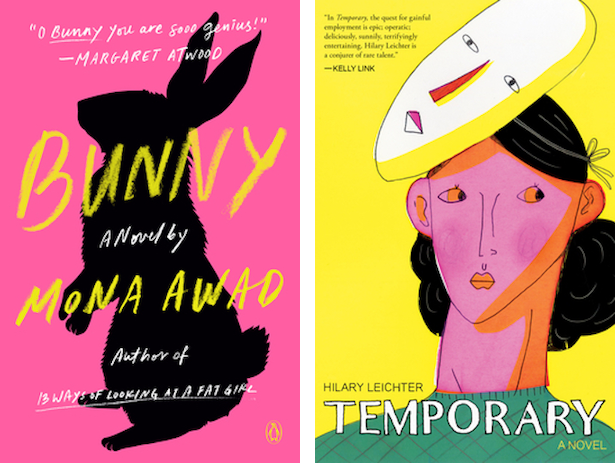
Mona Awad’s Bunny is that rare work of “literary fiction” that uses body horror well enough to be properly gross, and mystery well enough to be properly creepy. When I recommend it to people I usually cite Donna Tartt’s classic campus novel, The Secret History, but I think Bunny might succeed a bit more as horror. Very quick non-spoiler summation: Samantha Heather Mackie is part of the first-ever all female fiction cohort in Warren University’s prestigious MFA program. The other four women, all twee rich girls who have nicknamed each other “Bunny”, hate Samantha. To escape feeling like a pariah she spends most of her time with Ava, a manic pixie goth townie, until the fateful day that the Bunnies invite her to the afterhours workshop they call “Smut Salon”, and she learns the true nature of their final project. If you, or anyone you love, has ever been in a writing workshop, this may help ease your pain.
You can read my full review of Hilary Leichter’s Temporary here, but the capsule review is that this book was one of the most delightful reading experiences I had all year, but more than simply being a fun bit of surrealism, Leichter’s debut digs deep into everything that’s wrong with the gig economy, and all the ways the commodification of human life strips people of their self-worth. But having said that, it’s a blast to read.
—Leah Schnelbach
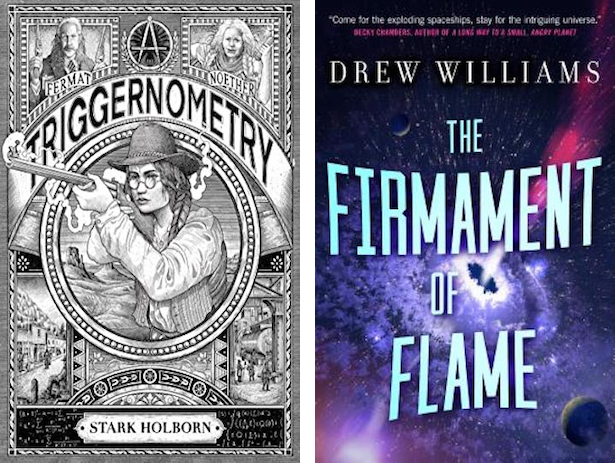
Stark Holborn’s Triggernometry is pulp-inflected Western novella, set in a world where math is outlawed. It is pleasantly odd, which is an understated way of describing Holborn’s protractorpunk vision. Like Holborn’s previous Western, Nunslinger, the real virtue of Triggernometry is how it ascends past its catchy pulp premise, and uses its charming concept to deliver complex characters dealing with murky moral problems.
Drew Williams’ space opera series scratches my Star Wars itch, and then some. And the third volume, The Firmament of the Flame, continues the series’ brilliance. Yes, there are super-powered rebel space warlock ninjas fighting a desperate battle against the overwhelming forces of an evil galaxy-spanning empire – and that’s all good. But Williams’ books spend a lot of time (subtly) investigating the why as well as the kablooie: Interwoven with the ass-kicking is a fascinating interrogation of faith, justice, and humanity. The characters may be (far) more than human, but they never lose their humanity, and the series is all the better for it.
—Jared Shurin
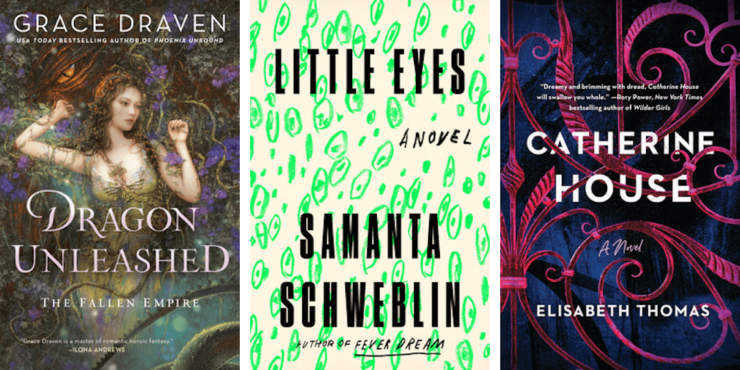
Grace Draven is a treasure to the romantic fantasy genre with her stunning world-building skills and well-developed heroines and heroes. Her latest book, Dragon Unleashed, returns to the Krael Empire, where Malachus is one of the last dragon shifters and from a line that had been sadistically hunted by the royals. He meets traveling free trader, Halani, and they each must come into their own power even if it tears them both apart.
In Little Eyes, by Samanta Schweblin, master of experimental horror, a new companion-toy appears homes across the world and we follow cast of characters as their discover how our darkest parts are exposed when we invite invisible strangers into our inner sanctums. Chilling and brilliant, Schweblin reveals human nature’s inherent monsters.
My favorite book of 2020 so far, hands down, is Catherine House, by Elisabeth Thomas. Like Carmen Maria Machado, Thomas bends, twists, and transcends genre, but we get a dark, delicious taste of everything along the way, from gothic to sci-fi. Set in a decaying mansion that houses an exclusive private college, Ines runs through Catherine’s gates to escape a haunting incident. During her three-year term, she discovers some secrets are too terrible to stay buried.
—Angela Maria Spring
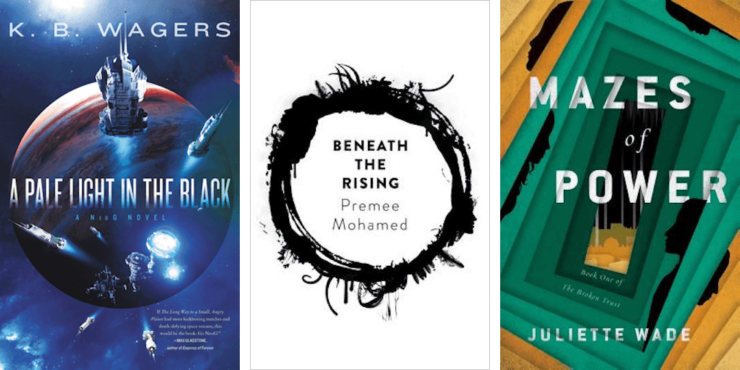
Maxine Carmichael of that Carmichael family seeks to make a name and a place for herself far away from the crushing gravitational field that is her family. A Pale Light in the Black by K.B. Wagers is the story of her finding a place in the Neo-G, a solar system space Coast Guard, discovering the possibility of a found family, even as a troubling mystery may undo the Neo-G, her family, and the entire solar system. Oh, and trying to win the annual Boarding Games competition between various branches of the armed forces, the closest thing the 25th century has to our Olympics. Action packed, full of heart, and fun.
Premee Mohamed’s debut novel Beneath the Rising sits firmly within the tradition of Neo-Lovecraftiana, with a story of two young best friends, the teenaged rich genius Jonny Chambers and the less well off Nick Prasad long caught in her wake, who must stop the Eldritch Apocalypse that her latest invention, an attempt at clean power energy, has unwittingly started. A global chase, with lots of humor, heart, and the painful unfolding of the nature and true history of their relationship. Sharply focused and written.
A stunning work of sociological science fiction, Juliette Wade’s Mazes of Power follows in the tradition of authors like Joanna Russ and Ursula K. Le Guin to bring a story of a very peculiar human culture living in a slowly decaying underground city to vivid and rich life. Wade’s talents for Worldbuilding are married here to a sharply focused character-focused story. This story unfolds a conflict between two brothers which could help shape the future of not only their family, not only their caste, but of their entire city. My favorite novel of the year thus far.
—Paul Weimer










